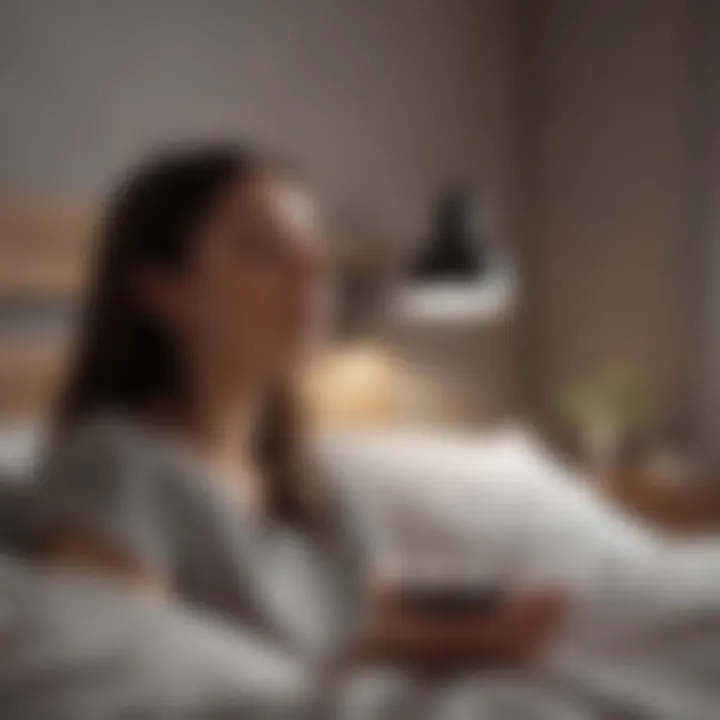Effective Strategies to Stop Nocturnal Panic Attacks


Intro
Nocturnal panic attacks can profoundly disrupt an individual's sleep experience, creating a cycle of fear and anxiety that affects overall health. Understanding how to stop these attacks is critical. This article discusses various methods, grounded in mindfulness, meditation, and stress management.
Understanding Mindfulness
Mindfulness is the practice of focusing one's awareness on the present moment. This focus encourages a calm and non-judgmental awareness of thoughts and emotions, aiding in the recognition and avoidance of heightened levels of stress and anxiety. The benefits of mindfulness extend to many areas of life, including emotional stability, enhanced focus, and improved interpersonal relationships.
What is mindfulness and its benefits
Mindfulness is more than just breathing exercises or meditation. It's about a full immersion into the current moment. Practicing mindfulness can increase emotional resilience and improve overall well-being. It allows individuals to observe their thoughts without immediate reactions, providing valuable insights. When one can observe thoughts that lead to panic, it becomes easier to manage them instead of reacting with fear.
Importance of mindfulness in daily life
Integrating mindfulness into daily routines fosters a sense of control in chaotic moments. It fosters a band that binds daily stressors to a continuum of well-being. With regular practice, an individual develops an enhanced ability to confront disturbances, which contributes profoundly to preventive strategies against nocturnal panic attacks and enhances coping mechanisms.
Practices and techniques for cultivating mindfulness
Some effective practices center on meditation, focused breathing, and mindful walking. Furthermore, journaling and engaging senses can augment awareness:
- Meditation: Daily sessions of as little as 10 minutes can create a substantial increase in awareness and presence.
- Breathing exercises: Focusing on breath can ground an individual instead of spiraling into anxiety.
- Engaging senses during walks: Utilizing the sight, sound, and touch reconnects one to the surrounding environment.
Such techniques can improve mental clarity and provoke an overall sense of peace, equipping individuals to better manage nocturnal panic attacks.
Guided Meditation Sessions
Guided meditations have emerged as an organized means of enhancing mindfulness. Participants listen to pre-recorded instructions, providing a structured environment for floating into a restful consciousness.
Different types of guided meditations available
Many forms cater to diverse preferences. Some popular options include:
- Sleep meditations: Specifically designed to induce sleep.
- Anxiety relief meditations: Targeting panic and emotional overwhelm.
- Gratitude meditations: Focusing on positive feelings helps ease anxieties.
How to start a guided meditation practice
There are ample resources available online. Websites and apps like Headspace and Calm offer both accessible and structured paths to begin. Starter sessions often last only a few minutes, gradually escalating to longer practice.
Tips for enhancing the meditation experience
Creating an ambiance conducive to meditation helps immensely. A designated quiet space free from disturbances promotes relaxation:
- Use comfortable seating or lie down loosely.
- Ensure adequate lighting to create a calming atmosphere.
- Play soft, ambient sounds or calming music.
These practices can enrich the individual’s meditation experiences, leading to greater tranquillity and better sleep overall.
Managing Stress and Anxiety
Stress and anxiety can act as precursors to nocturnal panic attacks. Discernment of their causes is vital to create targeted strategies that reduce their prevalence.
Causes and effects of stress and anxiety
Factors contributing include:
- Environmental factors: Difficult work situations, noise, or intense schedules.
- Personal life challenges: Relationship issues or health concerns.
- Biological predispositions: Family history of anxiety disorders.
Recognizing these influences provides foundational insight for interventions that could mitigate nocturnal panic.
Mindfulness techniques for reducing stress and anxiety
Mindfulness promotes awareness that counters anxiety’s immediate effects.
Learn and implement practices such as:
- Body scan meditations: Releasing tension progressively from head to toe.
- Breathing techniques: Alone can slow heart rate during intense pressure.
Coping strategies for dealing with overwhelming emotions
Treating anxiety can require continued thoughtfulness within one's day. Attendance to all forms of one's emotions promotes mental shift away from panicking by accepting what cannot be immediately changed. Techniques include:
- Regular physical activity to reduce stress hormones in the body.
- Maintaining an interconnected support system by sharing feelings with trusted family or friends.
Improving Sleep Quality
It is clear that quality sleep plays a significant role in emotional and physical health. Reductions in unrest are necessary for avoiding nocturnal panic attacks.
Importance of quality sleep for overall well-being
Good sleep enhances cognitive function and emotional balance. Therefore, a full night's sleep attunes one's mental flexibility. Individuals should aim for approximately 7 to 9 hours each night for optimal performance during the day.
Guided meditations for better sleep
Inclusion of guided sleep meditation into nightly routines abstracts stress as distractive barriers fade away. With calming practices, sleep compounds, allowing slumber more restorative.
Tips for creating a calming bedtime routine
For better sleep:
- Limit screen time by turning off electronic devices at least an hour before bed.
- Establish a consistent sleep schedule for relaxing bedtime rituals such as warm baths or light stretching exercises.
Enhancing Mindfulness at Work
A notable facet in resilience building involves productivity enhancement by cultivating a mindful workplace. Such environments are conducive to innovative thought and decrease the likelihood of stressful outcomes.
Benefits of mindfulness in improving work productivity
A higher concentration yields an improved capacity to process relating cognitive functions, ultimately increasing output. Employees practicing mindfulness often report reduced workplace anxiety and elevated engagement levels.
Mindful practices for a more focused and efficient workday


Consider practices that entwine seamlessly into daily office routines:
- Establish time blocks during workflows to imbue progress and stave off feeling overwhelmed by distractions.
- Use postural adjustments and stretch during opportune times.
Techniques for managing work-related stress
Workplace stress management can leverage collective strengths. Hence, combined group mindfulness exercises support relational integrity. Sessions conducted on collaborative tools benefit refreshment petty churns of information overload.
Regular reflections on stress levels transform sustainability for people working in complex environments.
Mindfulness encapsulates numerous pathways for addressing somatic disturbances, ultimately workplaces that prioritize it may see reduced nocturnal panic experiences. Emphasis on these practices empowers individuals, bettering overall quality of life through restful nights.
Understanding Nocturnal Panic Attacks
Nocturnal panic attacks can profoundly affect an individual’s well-being and sleep quality. Understanding these attacks is essential in managing their effects. Often, people feel isolated or confused when these experiences occur. This lack of understanding can exacerbate the anxiety surrounding sleep and nighttime. Through enhancing knowledge, one can cultivate strategies that promote better sleep hygiene and comfort.
Defining Nocturnal Panic Attacks
Nocturnal panic attacks refer to sudden and intense episodes of fear that occur during sleep. These attacks typically take place in the night, awakening individuals from sleep, often leading to feelings of terror and disorientation. They can come without any warning and frequently include physical symptoms such as a racing heart, difficulty breathing, and sweating. For many, the realization that it was just a panic attack does little to alleviate the immediate distress.
Symptoms of Nighttime Panic Attacks
The symptoms vary widely among individuals, but several common indicators may include:
- Rapid heartbeat: Individuals may feel as though their heart is pounding or racing.
- Shortness of breath: This can make the person feel suffocated or as if they cannot catch their breath.
- Intense fear: There may be an overwhelming feeling of dread without any identifiable cause.
- Chest discomfort: Some may experience pain or tightness in the chest, which can create fear of a heart attack.
- Numbness or tingling: Sensations that manifest in extremities can further heighten anxiety during an attack.
These symptoms may closely mirror those of physical health emergencies, which can confuse an individual in the situation.
Differences Between Nocturnal and Daytime Panic Attacks
Understanding the differences between nocturnal and daytime panic attacks can potentially inform treatment and management strategies. Notable contrasts include:
- Timing: Nocturnal panic attacks occur during sleep, whereas daytime attacks happen while the person is awake.
- Awareness: Daytime panic attacks may allow the participant to identify triggers actively, while nocturnal attacks happen unpredictably, often interrupting sleep unaware.
- Sedentary vs. Active state: Nocturnal panic often catches individuals off guard. In contrast, daytime cases can arise from active stressors.
It's imperative to recognize and differentiate these situations to generate effective coping strategies. This scrutiny is critical because tailored responses to these experiences will enhance potential recovery and overall mental fortitude.
Causes of Nocturnal Panic Attacks
Understanding the causes of nocturnal panic attacks is essential for identifying effective mitigation strategies. Panic attacks at night can arise from a multitude of sources. By grasping the underlying triggers, individuals can better address their nighttime anxiety. This section delves into biological, psychological, and environmental influences that contribute to these episodes.
Biological Factors
Genetic predisposition
Genetic predisposition plays a significant role in an individual's likelihood of experiencing nocturnal panic attacks. Those with a family history of anxiety disorders might find that they have a higher risk of similar experiences. This connection suggests that genetics affect one's brain chemistry and response to stress. In fact, understanding this factor may help someone determine if they need further interventions. Also, recognizing a genetic background enhances the awareness of identifying panic triggers. Yet, it does not solely dictate one's experiences, offering resilience through additional strategies.
Neurotransmitter imbalances
Neurotransmitter imbalances can contribute to the development and intensity of nocturnal panic attacks. Key neurotransmitters, such as serotonin, norepinephrine, and dopamine, must exist in a delicate balance for proper emotional regulation. Some individuals might have naturally lower levels, leading to increased susceptibility to panic experiences. This aspect provides insight into the biochemical underpinnings of anxiety disorders. However, no single imbalance fits all situations, so understanding personal responses helps navigate these challenges.
Psychological Triggers
Stress and anxiety
Stress and anxiety are predominant psychological triggers for nocturnal panic attacks. Heavy daily stressors can seep into one's sleep, making peacefully resting almost impossible. People facing above-average anxiety levels, whether from work, relationships, faamily issues, or life transitions, may trigger nocturnal panic. The connection is evident, study shows people with heightened anxiety can experience disrupted sleep patterns, diminishing overall sleep quality. Additionally, recognizing the impact of stressors can aid in effectively managing and reducing these incidents.
Trauma history
An individual's trauma history could be another determining factor in the frequency of nocturnal panic attacks. Past experiences that may have resulted in psychological scars can resurface during sleep. For those with unresolved trauma, nighttime can become a reminder of their pains, leading to fear and subsequently, panic. Sourcing anxiety through understanding one’s past, quitting avoidance behaviors can significantly impact addressing sleeplessness related to panic. This awareness lays the groundwork for healing.
Environmental Influences
Sleep environment
The sleep environment cannot be overlooked either. Factors like noise, light, or even simply clutter can create conditions prone to awakening feelings of stress or anxiety. A peaceful, tidy, and inviting space can promote a sense of safety necessary for returning to restful sleep. While optimizing surroundings may not eliminate panic entirely, implementing basics like sound machines or blackout curtains improves the experience of attempting sleep.
Substance use
Substance use is notorious for adversely affecting sleep patterns and anxiety levels. It includes caffeine, alcohol, and recreational drugs. Overuse of these substances decreases overall emotional regulation and interrupts normal sleep cycles. By being conscious of intake from these sources, individuals can often witness noticeable differences. Recognizing the correlation aids in overall anxiety management and can pave the way towards lessening nocturnal panic.
Understanding these various causes is crucial for implementing helpful techniques for stopping nocturnal panic attacks effectively. Awareness of roots creates opportunities for sense of empowerment and recovery.
Recognizing Patterns and Triggers
Understanding patterns and triggers of nocturnal panic attacks is crucial. Being aware of what's behind the attacks can empower individuals to manage them more effectively. By paying close attention to the components that contribute to these incidents, individuals gain insights that can help them apply appropriate preventive measures. Recognizing patterns and triggers fosters a sense of control and can reduce the intensity of the panic attacks.
Keeping a Sleep Diary
One valuable approach for understanding panic attacks is keeping a sleep diary. This diary can help track sleeping habits and mood fluctuations. Recording details such as bedtime, wake time, and quality of sleep can be enlightening. Note any occurrences of panic attacks alongside notitable stressors or lifestyle changes.
Benefits of a Sleep Diary
- Identifies trends over time.* After maintaining a record for several weeks, patterns in incidents and sleep quality may emerge.
- Eliminates guesswork.* Detailed information provides clarity instead of relying on memory.
- Facilitates discussions with a professional.* Having documented notes can be useful in therapy. Providers prefer data-driven approaches to derive effective coping strategies.
Identifying Common Triggers
Understanding common triggers is pivotal to managing nocturnal panic attacks. Triggers can vary significantly among individuals. Thus, repeating the investigation becomes essential. Here are some frequent triggers identified by those experiencing such attacks:
- Emotional stress from work or personal issues.
- Physical discomfort, such as not feeling well.
- Consuming caffeine or other stimulants, particularly late in the day.
- Environmental factors like loud noises or uncomfortable room temperature.
It is important to re-evaluate situations often to discover new emerging patterns.
Paying close attention to one’s habits aids significantly in anxiety management.
By tracking both the recharge patterns throughout the day and potential disturbances, the process of leader the anxiety will tend to become smoother with time.
Individuals experimenting to find solutions must remain vigilant and adaptive, altering scenarios to find comfort. Through consistent analysis, one can create an actionable plan tailored to their unique experience, which can ultimately lead to a more peaceful night.
Practical Strategies for Prevention
Preventing nocturnal panic attacks is essential for those affected. By creating an structured approach to sleep and integrating relaxation techniques, individuals can reclaim their nights. Effective strategies can promote a sense of safety during bedtime and thereby reduce the likelihood of panic attacks.


Establishing a Healthy Sleep Routine
Consistent sleep schedule
A consistent sleep schedule plays a significant role in managing sleep quality and mental health. This aspect encourages going to bed and waking up at the same times every day. By maintaining this routine, the body adjusts its internal clock, often resulting in enhanced sleep quality. This regularity is beneficial as it can reduce anxiety levels, which is a key factor contributing to nocturnal panic attacks.
Unique characteristics of a consistent schedule include better hormonal regulation, which aids in overall mental function. Though it may require initial discipline to establish, the long-term advantages clearly outweigh the temporary inconveniences. Individuals often notice an improvement in their overall mood and energy levels to adapt to such a routine.
Optimal sleep environment
Creating an optimal sleep environment goes beyond mere comfort. This concept incorporates aspects like ambient noise control, room temperature, and sleeping conditions. A dark, quiet, and moderately cool environment typically promotes restful sleep. People sleeping in such settings show better resilience to panic symptoms due to feeling secure.
The importance of an optimal environment emerges from its key characteristic of minimizing disruptions or anxieties that can provoke panic episodes during the night. One key advantage of this setup is aiding rapid sleep onset, resulting in deeper sleep. However, one challenge could be adjusting current settings without significant disturbances to one's lifestyle.
Incorporating Relaxation Techniques
Mindfulness meditation
Mindfulness meditation presents a promising avenue in battling anxiety and establishing calmness before sleep. It mirrors conscious engagement with one's surroundings but turns inward. During mindfulness practices, people often become aware of their bodily sensations and mind’s narrative, thus reducing cognitive distortions that fuel anxiety.
This approach stands out due to its effectiveness. Regular practice leads to a naturally reduced stress response, essential for lowering panic attack occurrence. Although nuances like personal style of meditation can vary, the journey to discovering what best suits an individual can significantly enhance their relaxation routine and ultimately lead to better sleep quality.
Deep breathing exercises
Deep breathing exercises, when done properly, can initiate bodily relaxation. By focusing on inhaling deeply through the nose and exhaling gently through the mouth, anxiety reduction occurs. Such exercises can positively affect heart rates and provoke calming effects on the autonomic nervous system.
Among the advantages of deep breathing are its accessibility and ease of execution. They can be performed almost anywhere, interrupting rising anxious feelings before bed. However, setting aside time dedicated to these practices may require commitment, which ultimately pays off by gradually teaching one's body to respond to anxiety in healthier ways.
Engaging in practical strategies for sleep prevention truly marks a shift towards empowerment. These approaches nurture overall wellbeing and can profoundly impact daily experiences of anxiety.
These methods paint a richer picture of tools individuals can weave into their life. Through consistency, building an optimal space, and practicing relaxation, people can mitigate the job of dreamy distress. Dabble in what orders and actions suit personal schedules, and build a peace-friendly atmosphere along the way.
Cognitive Behavioral Approaches
Cognitive Behavioral Approaches are essential when addressing nocturnal panic attacks. These strategies focus on understanding and altering the thought patterns that trigger anxiety and panic. They empower individuals to take control over their emotional responses, particularly during night hours when fear and uncertainty can manifest. By working through thoughts, patients can reshape their perception, ultimately reducing the intensity or frequency of attacks.
Maximizing the effectiveness of these approaches can lead individuals towards a path of improved mental well-being.
Cognitive strategies help cultivate a more peaceful mindset at bedtime and throughout the day.
Changing Thought Patterns
Changing thought patterns involves identifying negative and distorted thoughts that increase anxiety. Individuals often experience irrational thoughts at night, fearing they won't be able to breathe or that something terrible is impending. This cycle can become automatic, creating a loop that intensifies panic.
To break this cycle, start by:
- Becoming aware of negative self-talk. Keep a journal near the bed to write troubling thoughts when they arise.
- Challenging these thoughts. Ask if they are based on facts or assumptions.
- Replacing them with more rational and balanced thoughts. For instance, if you fear losing control, remind yourself you have been through difficult times already without disaster.
Reflection and acknowledgment play key roles in this transitional period. Over time, consistent practice can lead to fewer intrusions by panic-inducing thoughts.
Exposure Therapy Techniques
Exposure therapy is a crucial cognitive behavioral treatment option. It aims to expose individuals gradually to the feared situation, helping them manage their fear response. When used specifically for nocturnal panic attacks, it may target the anxiety related to sleep and nighttime experiences.
Key aspects to explore in exposure therapy include:
- Progressive exposure: Begin by recalling a time of panic. This Power of visualization can help you mentally prepare for actual exposure.
- Simulated environments: Create a controlled space that mimics nighttime fears. Practices like lying in a darkened room, focusing on calming in-rotation music, or soft noises may help.
- Gradual increases: Increasing exposure frequency or length can empower coping mechanisms. This technique primes one to navigate anxiety more calmly over time.
Adhering to a safe framework is essential to prevent overwhelming feelings. With consistent practice, exposure therapy might guide you towards a sense of mastery over panic responses, especially in the vulnerable nighttime hours.
Conclusion: Think systematically about changing thought patterns and practicing exposure therapy. Flexibility and gradual challenge allow these techniques to build formidable defenses against nocturnal panic.
Seeking Professional Help
Seeking professional help can play an important role in managing nocturnal panic attacks. Often, these disturbances are linked to underlying mental health conditions such as anxiety disorders or depression. A qualified mental health professional can support individuals in identifying the root causes and crafting effective coping strategies.
The first step is recognizing when it's necessary to consult a therapist. Individuals experiencing repeat panic attacks or feelings of being overwhelmed might consider seeking help. Increased frequency of occurrence or noticeable interference with everyday life suggests that professional intervention may be beneficial. Additionally, when self-help strategies and lifestyle changes do not yield improvements, connecting with an expert becomes increasingly relevant.
When to Consult a Therapist
Consulting a therapist is not about disempowerment; it can be a proactive measure in one’s journey toward recovery. If attacks occur regularly or seem unmanageable, it’s wise to connect with a professional. Pay attention to any ongoing anxiety, persistent worries, or behavior changes. If these symptoms accompany nocturnal episodes, reaching out for expertise can provide valuable perspective and resources.
Consider discussing with a therapist if you:
- Feel isolated or unable to share your experiences with friends.
- Are having issues with substance use as a coping mechanism.
- Experience significant distress during nightly panic episodes.
Through therapy, individuals gain access to tailored insights, emotional support, and adaptive techniques that may not be readily apparent.
Therapeutic Options Available
Evaluating therapeutic options is critical for those seeking management of nocturnal panic attacks. Two primary choices include medication and psychotherapy. Each presents unique advantages and features.
Medication
Medication can serve as a significant contributor to overall mental well-being. Selective serotonin reuptake inhibitors (SSRIs) and benzodiazepines are two common classes used for symptoms associated with panic disorders. SSRIs, such as fluoxetine and sertraline, gradually enhance neurotransmitter levels, targeting anxiety directly over time. It's popular since the upsides usually meet a steady recovery process with less direct complexity than other options. On the downside, these medications may take weeks to become effective and can carry unwanted side effects.
Psychotherapy
Psychotherapy offers individuals a structured approach for addressing nocturnal panic episodes. Cognitive Behavioral Therapy (CBT) focuses on challenging negative thought patterns that fuel anxiety. A unique feature is its collaborative nature, enabling individuals to identify irrational beliefs that provoke panic attacks, fostering better coping mechanisms. The setback is that therapy often requires more commitment over time than medication.
Remember, there's no shame in seeking help—it's a critical part of taking charge of your mental health.
The Role of Lifestyle Changes
Lifestyle changes play a vital role in managing nocturnal panic attacks. These attacks can often arise from various factors, including biological, environmental, and cognitive elements. By making specific adjustments to daily habits and routines, one can significantly reduce the frequency and severity of these unsettling events. It is essential to recognize that integrating lifestyle changes pays dividends in the form of enhanced sleep quality and overall mental well-being. Establishing healthier patterns offers both immediate relief and long-term benefits for individuals prone to nocturnal panic attacks.
Adopting a Balanced Diet
A balanced diet is one of the foundational aspects of coping with nocturnal panic attacks. What we consume directly affects our mood and anxiety levels. A well-rounded diet should include a variety of nutrients to support both physical and mental health.
- Fruits and vegetables: These are rich in vitamins and minerals that promote better brain function.
- Whole grains: Quinoa, brown rice, and oats provide stable energy, which can mitigate anxiety sensations.
- Protein sources: Including legumes, eggs, and fish can support neurotransmitter production, creating a sense of stability in mood.


Processed foods often contain additives that can destabilize our mental health. Sugary snacks and beverages can lead to blood sugar spikes and crashes, which can in turn mess with anxiety levels. Focus on wholesome foods, as they serve not just to nourish but to enhance mood and reduce panic episodes. Choosing to avoid heavy meals right before sleep may also help lower the chance of encountering nocturnal panic.
Regular Physical Activity
Engaging in regular physical activity is crucial for both physical and mental health. Exercise promotes the release of endorphins, which are essential in combating feelings of anxiety. Even moderate forms of activity have substantial benefits. Here are some recommendations:
- Aim for at least 150 minutes of moderate exercise weekly. This may include brisk walks, swimming, or yoga.
- Focus on consistency rather than intensity. Developing a routine can anchor physical activities in daily life, making it easier to stick to them.
Incorporating mindfulness with physical activities, like yoga or tai chi, not only improves fitness but also teaches valuable techniques to manage stress levels. It's crucial to find an enjoyable exercise routine, as this consistency will contribute to reduced anxiety and improved sleep quality.
Reducing Stimulant Intake
The choice to limit stimulants is pivotal for addressing nocturnal panic attacks. Stimulants like caffeine, nicotine, and certain medications can increase anxiety levels, leading to a greater risk for panic episodes at night.
Strategies for Reducing Stimulants:
- Caffeine: Opt for caffeine-free alternatives, especially in the afternoon and evening. Consider herbal teas, decaffeinated beverages, or simple water as options.
- Nicotine: Quitting smoking or using nicotine products can lead to remarkable improvements in health and well-being. If quitting completely feels overwhelming, try to reduce gradually.
The awareness of what goes into our bodies extends to even minor choices and can make a significant difference. Limiting these substances sets positive data inputs for our tempting brains, allowing it more room to focus on calming routines rather than rising anxious ones.
Balancing diet, exercise, and stimulant intake creates a comprehensive approach to manage nocturnal panic attacks. This holistic method allows individual improvement through manageable lifestyle commitments.
Making these choices might initially seem inconvenient or challenging, but persistence manifests noteworthy results over time. By being conscientious of our lifestyle habits, one can leverage positive change not just in sleep quality but its overall impact on days lived fully.
Mindfulness and Relaxation Techniques
Mindfulness and relaxation techniques play a crucial role in managing nocturnal panic attacks. These strategies may likely help create a calmer mental environment, facilitating a more peaceful sleep. Mindfulness encourages individuals to pay attention to their thoughts without judgment. This practice can allow feelings of anxiety to dissipate during the night, breaking the cycle of panic.
Benefits include:
- Reducing overall stress
- Enhancing emotional regulation
- Improving sleep quality
Particularly important for those suffering from nocturnal panic attacks, relaxation techniques can lower physical tension. This allows for a transition into sleep without the pressure of racing thoughts or heightened emotional states. Engaging with these methods regularly can cultivate resilience, which may decrease future episodes of panic. Therefore, recognizing their potential benefits is the first step toward integrating mindfulness into your routine.
Importance of Mindfulness in Reducing Anxiety
Mindfulness has gained recognition for its potential to lower anxiety. It is about being present and observing thoughts impartially. When done correctly, this practice can serve as an effective buffer against the intensity of panic. Instead of becoming overwhelmed, individuals can learn to acknowledge anxiety as a passing experience.
Here are some key points to understand its effectiveness:
- Awareness: Noticing physical sensations linked to panic can prevent escalation.
- Detachment: Viewing thoughts as separate from self decreases their hold on emotional state.
- Grounding: Mindfulness shifts focus away from distressful thoughts, redirecting attention to breathing and surroundings.
According to various studies, spreading awareness can lead to lower levels of baseline anxiety. This forming of a positive feedback loop might cause mind quieting, enabling better sleep experiences. Practicing mindfulness, especially before bed, aligns well with sleep hygiene. It creates a welcoming environment for rest without anxiety-related impediments guiding your night.
Practicing Guided Meditations
Guided meditations can be an excellent starting point for those unfamiliar with mindfulness. These practices provide structured sessions led by an instructor, which can be comforting for novices. Today, many resources are available, offering varying lengths and themes focused on relaxation.
How to practice effectively:
- Choose a quiet space: Find an area free of distractions.
- Select a guided meditation: Use apps like Headspace, Calm, or YouTube channels dedicated to mindfulness.
- Focus on breathing: Listen attentively to the guidance, paying special attention to your breath.
- Be patient with yourself: Every meditation won't be perfect. It's normal for thoughts to wander.
Taking the time to practice guided meditation regularly can cultivate openness to sleep. As a result, detachment from stressful thoughts can become automatic. This shift can change your night's prospects dramatically, making space for more restorative sleep cycles.
Mindfulness and relaxation are step toward triumph over nightly panic. Integrating these techniques may open doors to undisturbed sleep and emotional well-being.
Effectiveness of Support Networks
Support networks play a vital role in managing nocturnal panic attacks. Engaging with a mix of professionals, support groups, as well friends and family can enhance coping strategies and offer emotional breadth. These networks serve as sounding boards for frustrations and fears, enabling individuals to voice experiences in a safe space. Furthermore, they reinforce the imperfect but comforting notion that others share similar struggles.
By surrounding oneself with empathetic individuals, one tends to feel more empowered. Support is not only about comforting remarks; it involves active strategies for problem-solving and accountability to trigger healthier bedtime routines. Each person brings unique perspectives, so individual suggestions can lead to novel coping techniques.
Engaging with Support Groups
Support groups have been instrumental for many who experience nocturnal panic attacks. Joining a community with shared experiences fosters connection. Here are several key considerations on engaging with these groups:
- Shared Experiences: Talking openly about feelings in a group eases isolation and creates a sense of belonging.
- Knowledge Exchange: Participants can share tips learned through personal experiences, that are often not found in clinical manuals.
- Physical Meetings or Online Forums: Flexibility allows participation to occur via physical meetings or on platforms like Reddit or Facebook, making it easier for anyone to join.
Additionally, online forums have which website offers a range of resources. Some companies or local Nonprofits invite guests for educational lecture panels and facilitate discussions based upon evidence-based practices.
Involving Family and Friends
Family and friends are essential allies in the fight against nocturnal panic attacks. Involving loved ones not only provides emotional support but also engages them in understanding and managing the condition. To involve them effectively:
- Educate Them: Help family and friends to grasp nocturnal panic attacks, discussing symptoms, causes, and what could instigate these experiences.
- Communicate Your Needs: Clearly express your requirements, whether it is more patience, helping remove stressors before sleep, or just a reminder about relaxation methods before bed.
- Regular Check-ins: Maintaining open and consistent dialogues fosters understanding and love, which is central in stressful times.
During challenging nights, contactable loved ones might provide vital verbal reassurances or direct assistance in addressingsf intense situations. This communal aspect alleviates feelings of helplessness, instilling strength through connecedness. Furthermore, they can remind practitioners of strategies learnt, contributing positively to improve habits over time.
In summary, both professional and personal support networks create a crucial community approach to minimize desafience and improve overall stability.
Involving support systems is not just a nicety but a necessity in navigating the tumultuous waters of nocturnal panic attacks. As one explores the depth of these attacks, engaging with those on similar journeys can often lead to more found solutions.
Monitoring Progress and Adjusting Strategies
Monitoring progress in combatting nocturnal panic attacks is critical. It enables individuals to not only track the frequency and intensity of their episodes but also evaluate the strategies they implement. This assessment imbues a sense of control, which is vital for enhancing emotional well-being.
Regularly Reviewing Sleep Patterns
A sleep diary can be an invaluable tool here. Writing down various aspects of your sleep can accelerate self-awareness. This diary ideally includes details such as:
- Times you go to bed and wake up
- Length of time it takes to fall asleep
- Instances of nocturnal panic attacks and their durations
- Feelings and thoughts prior to sleep
- Changes in lifestyle or environment
By establishing a pattern, identifying triggers becomes possible. If attacks seem to occur after stressful days, one can adjust lifestyle practices accordingly. Furthermore, noting down how you feel upon waking can be just as insightful. Recognizing if disrupted sleep leads to heightened anxiety levels during the day is essential.
Adjusting Techniques Based on Effectiveness
Once patterns are recognized, it is prudent to test various techniques for their effectiveness. This could mean varying relaxation methods, such as:
- Mindfulness routines
- Breathing exercises
- Progressive muscle relaxation
Importantly, compare the degree to which these techniques lessen anxiety or prevent nocturnal panic attacks. For effective adjustments:
- Rate the effectiveness on a scale from one to ten at regular intervals.
- A consistent reflection period can be helpful in evaluating what works well.
- Be open to change; personalization is often key.
In many instances, paying attention to responses can help in making the minor adjustments to lifestyle and behavior necessary for improvements. Additionally, managing expectations is crucial. Progress may not always align with perceptions of success. Furthermore, modifying techniques and maintaining commitment can build resilience.
Regular progress assessments empower individuals to tailor interventions that suit their unique circumstances.







